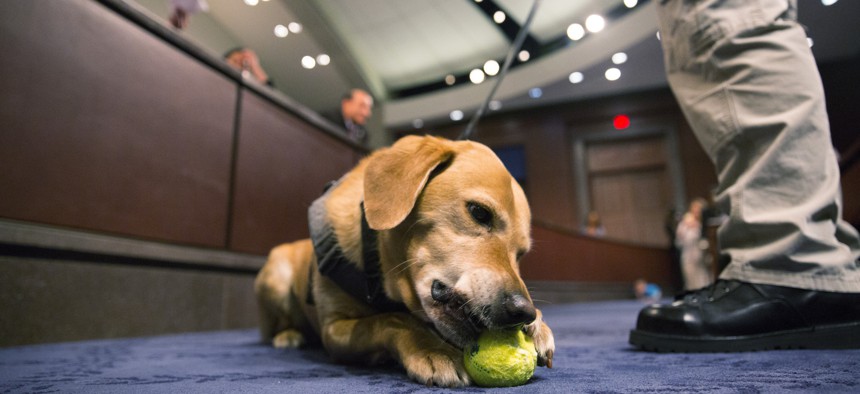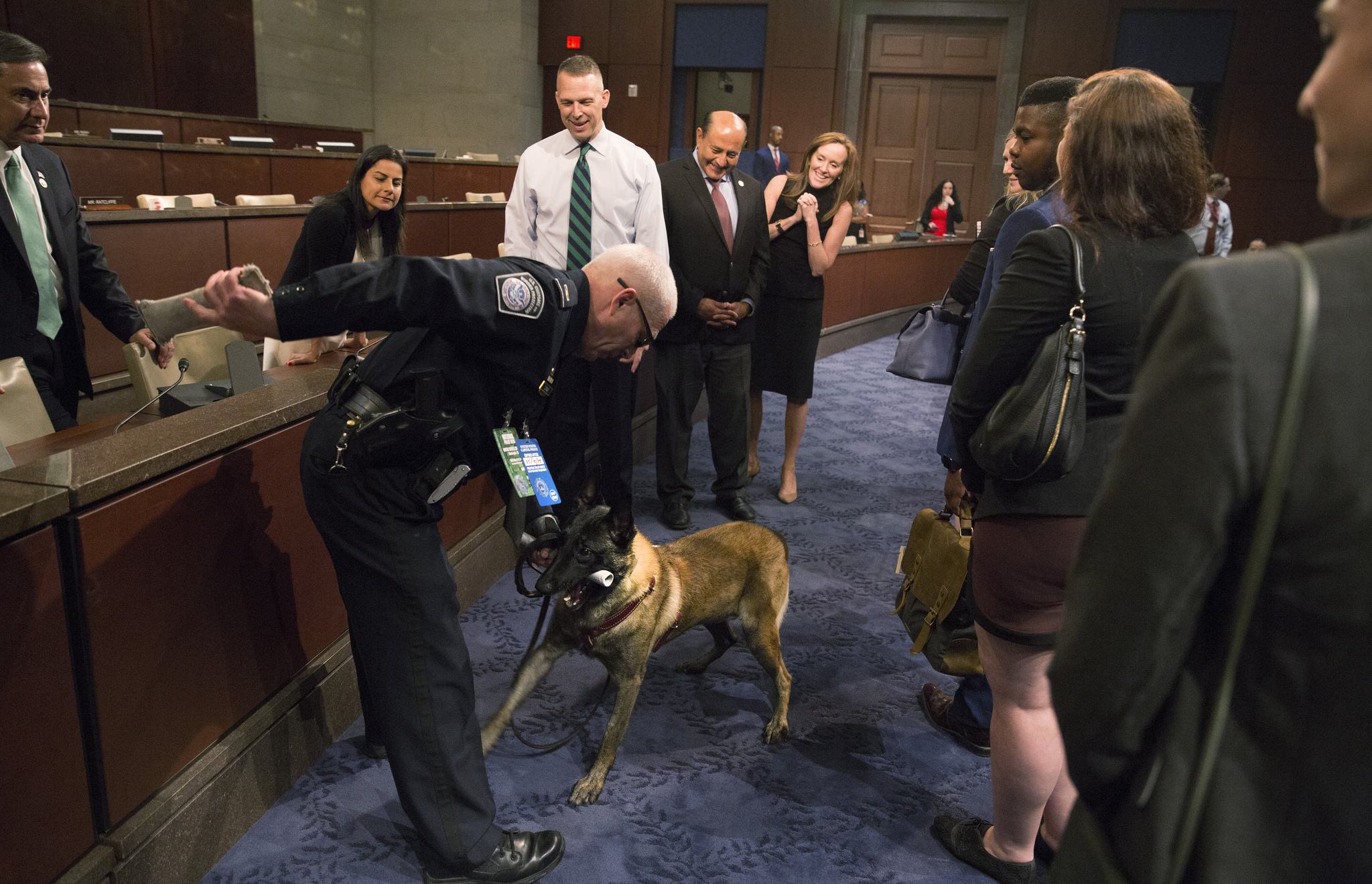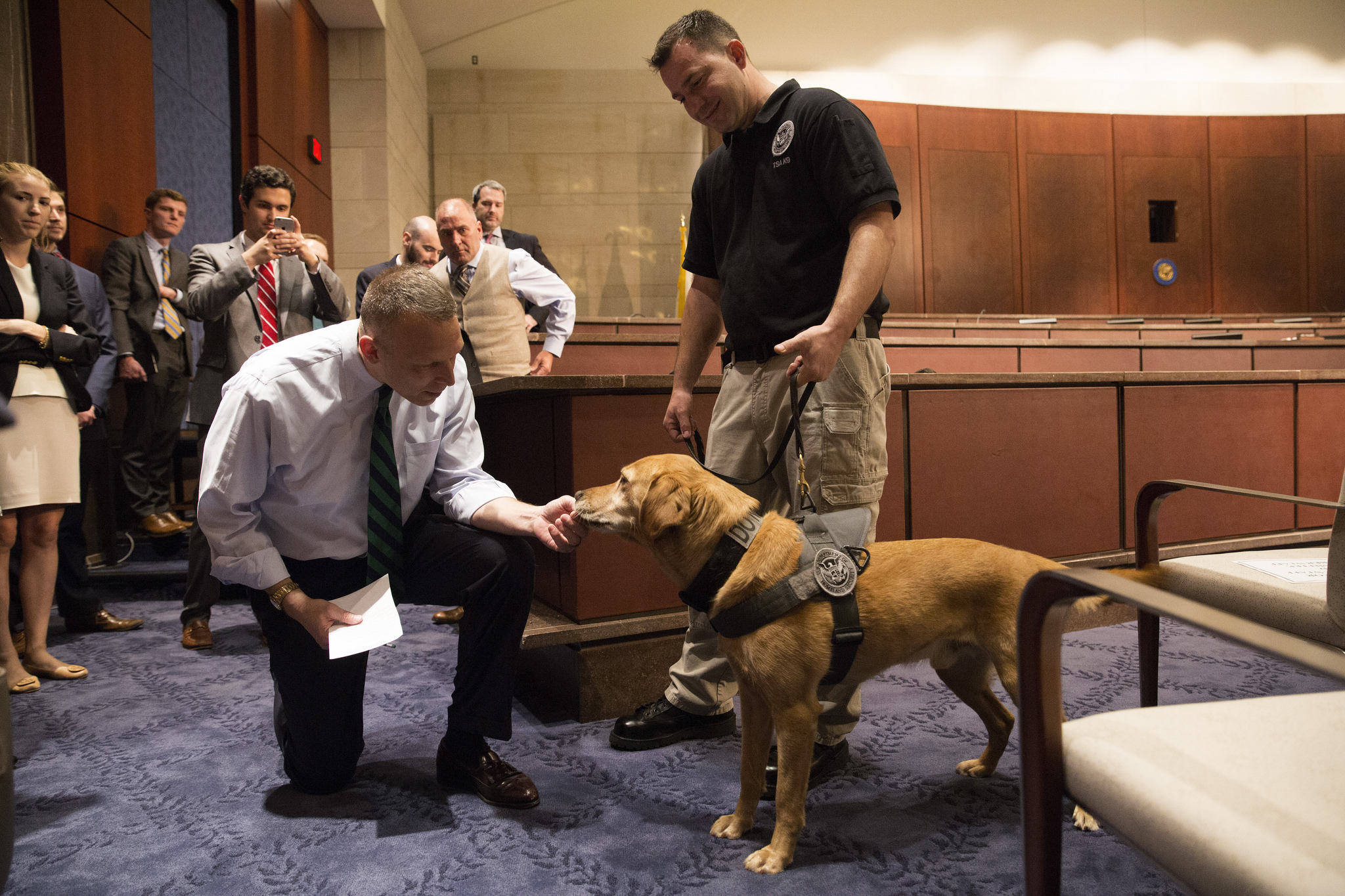
Reversa, part of a TSA passenger screening canine team, chews a ball during the hearing. Glenn Fawcett/Customs and Border Protection
Lawmaker Irked About 'Foreign' Airport Security Dogs
Rep. Gary Palmer says President Trump's "Buy American, Hire American" executive order should apply to TSA canines; agency says they're a domestic shortage of qualified dogs.
In a rare moment of bipartisan harmony, members of a House Homeland Security Committee found themselves in agreement Thursday on a key matter of national security: Dogs, they concurred, play a vital role in protecting the homeland.
The subcommittee on oversight and management efficiency heard testimony from five Homeland Security Department officials about the capabilities of canine law enforcement teams across the department and lawmakers witnessed demonstrations from three dog handlers and their four-legged partners.
The hearing was mostly a canine love fest. Subcommittee chairman Rep. Scott Perry, R-Pa., was unstinting in his praise for the dogs, saying their "detection abilities are unrivaled" and that "a canine’s nose may be our last line of defense" against terrorism.
Subcommittee ranking member Rep. J. Luis Correa, D-Calif., echoed Perry's accolades and couldn’t resist comparing the value of canine teams, the importance of which “cannot be overstated ,” to the more controversial value of President Trump’s proposed border wall. In praising Customs and Border Protection’s use of dogs, Correa said it is "imperative" that the canine teams "receive the resources they need.”

CBP employs over 1,500 canine teams in the United States. The agency's Canine Training Program Director Damian Montes and Border Patrol Law Enforcement Operations Specialty Programs Acting Chief Peter Jaquez outlined efforts to keep guns, drugs and undocumented people from flowing into the United States. In testimony , the officials explained that Border Patrol canine teams found 41,807 humans at the borders and seized of 419,175 pounds of narcotics and $5,918,862 in currency in 2016.
Border Patrol canine teams are also trained in finding human remains in crime investigations. In 2016, Border Patrol dogs assisted with 11 such recoveries.
Rep. Nanette Barragán, D-Calif., pressed Montes on CBP operations capabilities at seaports. He explained that CBP canine scent training is "deployed universally" via the two CBP training centers in El Paso and Front Royal, Virginia.

Melanie Harvey, the Transportation Security Agency's threat assessment division director, said the public is most likely to interact with TSA dogs. The agency has 800 canine teams at over 100 airports.
Rep. Gary Palmer, R-Ala., provided the only contentious moments of the hearing when he questioned Harvey on TSA's dog procurement practices. Palmer noted that he himself had recently been at Ronald Reagan Washington National Airport and saw very few canine teams.
“You pull up to the curb and you see a squad car, a police car, but you don't see a dog,” Palmer said. “I spent three hours in the Delta line . . . there were no patrols with dogs or anything. And that concerns me that we're not doing that.”
Palmer, a member of the conservative Freedom Caucus, pressed Harvey on the procurement issue, citing Trump's "Buy American, Hire American" executive order . Harvey assured Palmer that the TSA has “an interagency agreement with DoD. We use the same vendors that they use . . . We also have a couple of agreements with domestic vendors from which we also get dogs.”
Still, Palmer complained that TSA dogs were being “foreign sourced.”
“The administration has an emphasis on 'Buy American' and it seems to me it would make sense that you would prefer American dogs and American-trained dogs over foreign-sourced dogs,” Palmer said. “Particularly, the vendors that train them from puppies. Why do you have a preference in any context for foreign-sourced dogs?”
Harvey explained that TSA doesn’t prefer foreign dogs over domestic ones, but that vendors aren't always able to supply the dogs TSA needs. “We have a large requirement for our large number of dogs,” Harvey said. She added that TSA is working closely to ramp up procurement of dogs from domestic vendors.
Palmer wasn’t mollified. “We don't have the perimeter security that I think is necessary at our airports and rail transportation and other transportation hubs,” he said, noting that there are “contracts that you haven't fulfilled” for canine procurement.
Palmer’s concerns notwithstanding, the hearing concluded with bipartisan admiration for both the witnesses and the dogs in attendance.
“I think we can train [canine teams] to do even more,” Correa said. “I think we gotta go in that direction to defend our country to protect our citizenry and to make sure that you do the best job you can to protect our country.”
Watch the entire hearing below:







